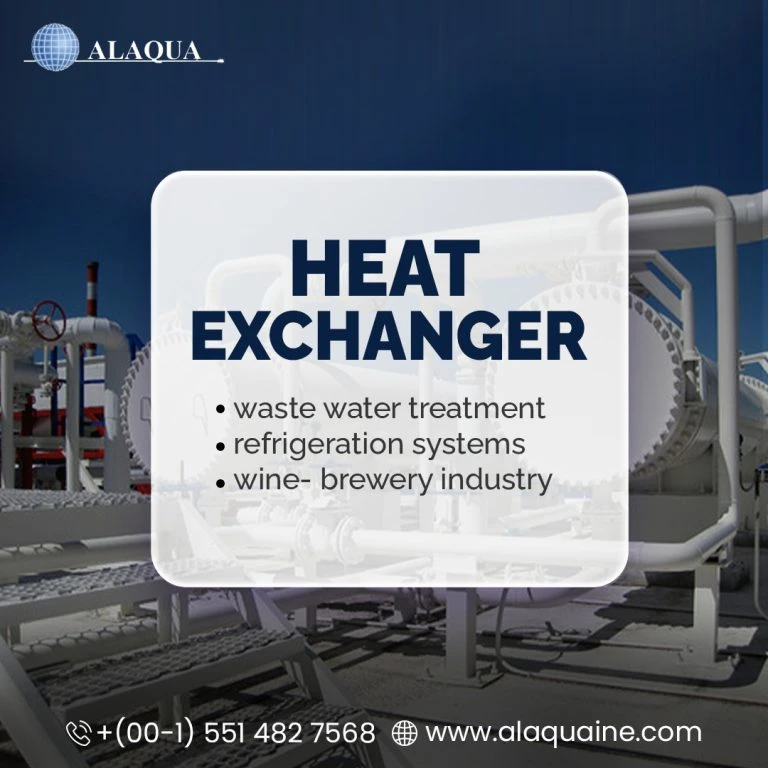These days, a heat exchanger evaporator is essential for efficient heat transfer between fluids in various processes. With advancements in technology and increasing demands for energy efficiency, choosing the right heat exchanger maker has become more crucial than ever. Moreover, selecting a manufacturer that meets your project\'s specific needs ensures optimal performance and reliability, making this decision a critical factor for success.
So, this guide will walk you through the essential considerations and steps to choose the best manufacturer for your specific needs.
Understanding the Role of Heat Exchangers
The purpose of heat exchangers is to transfer heat without mixing two or more fluids. They are used in various industries, including HVAC, chemical processing, power generation, and food processing. Moreover, the efficiency and performance of your system heavily depend on the quality and suitability of the heat exchanger you choose.
Types of Heat Exchangers

Before diving into selecting a heat exchanger maker, it\'s essential to understand the different types of heat exchangers available:
- Shell and Tube Heat Exchangers
- Plate Heat Exchangers
- Air-Cooled Heat Exchangers
- Double Pipe Heat Exchangers
- Regenerative Heat Exchangers
Each type has its advantages and applications, so understanding your project\'s requirements is crucial.
Factors to Consider When Choosing a Heat Exchanger Maker
Things to keep in mind when choosing a heat exchanger maker in USA include the following:-
1. Industry Experience
Experience matters. Seek out manufacturers in your sector who have a track record of success. An experienced maker will have a better understanding of the specific challenges and requirements of your sector.
2. Customization Capabilities
Your project may have unique needs that off-the-shelf products cannot meet. Customization capabilities are essential. So, choose a manufacturer that can tailor their products to your specifications, ensuring optimal performance and efficiency.
3. Quality Standards
Quality cannot be compromised. Ensure the manufacturer adheres to international quality standards such as ISO 9001. Moreover, this certification guarantees that the manufacturer follows stringent quality management practices.
4. Technological Expertise
The field of heat exchangers is constantly evolving with advancements in materials and design. Select a maker that stays up-to-date with the latest technological innovations. This ensures that you get the most efficient and durable product.
5. After-Sales Support
After-sales support is crucial for the maintenance and longevity of your heat exchanger. Opt for a manufacturer that offers comprehensive support services, including installation, maintenance, and repairs.
6. Customer Reviews and Testimonials
One of the best ways to gauge a manufacturer\'s reliability is through customer reviews and testimonials. Look for feedback from previous clients to get an idea of their experiences with the manufacturer.
7. Cost vs. Value
Although cost is a significant element, it shouldn\'t be the only one taken into account. Assess the value offered by the manufacturer in terms of quality, efficiency, and support. Sometimes, a higher upfront cost can lead to significant savings in the long run.
8. Lead Time and Delivery
Timely delivery is critical for project timelines. Evaluate the lead time promised by the manufacturer and ensure it aligns with your project\'s schedule.
9. Environmental Considerations
With increasing emphasis on sustainability, consider manufacturers that implement environmentally friendly practices. Eco-friendly heat exchangers can help reduce your project\'s carbon footprint.
10. Warranty and Guarantees
A robust warranty and guarantee policy reflects the manufacturer\'s confidence in their products. Ensure that the heat exchanger maker offers satisfactory warranty terms.
Steps to Select the Right Heat Exchanger Maker
Step 1: Define Your Requirements
Start by clearly defining your project requirements. Consider factors such as the type of fluid, temperature range, pressure conditions, and space constraints.
Step 2: Research Potential Makers
Conduct thorough research to create a list of potential heat exchanger makers. Make use of peer referrals, industry periodicals, and internet resources.
Step 3: Evaluate and Compare
Compare the shortlisted manufacturers based on the factors mentioned earlier. Create a comparison chart to visualize the pros and cons of each maker.
Step 4: Request Proposals
Reach out to the top candidates and request detailed proposals. This should include technical specifications, pricing, lead time, and after-sales support details.
Step 5: Assess Proposals
Carefully assess the proposals received. Consider conducting interviews or site visits to get a better understanding of each manufacturer\'s capabilities.
Step 6: Make an Informed Decision
Based on your evaluation, select the heat exchanger maker that best meets your project needs. Ensure all terms and conditions are clearly defined before finalizing the agreement.
Common Pitfalls to Avoid
Ignoring Customization Needs
Failing to consider the need for customization can lead to suboptimal performance. Ensure the manufacturer can provide solutions tailored to your requirements.
Overlooking After-Sales Support
After-sales support is vital for the maintenance and longevity of your heat exchanger. Remember this when you\'re making your choice.
Focusing Solely on Cost
While budget constraints are real, focusing solely on cost can be detrimental. So, consider the long-term value and efficiency gains when making your decision.
Benefits of Choosing the Right Heat Exchanger Maker
Improved Efficiency
A high-quality heat exchanger designed to meet your specific needs will operate more efficiently. Eventually, this leads to energy savings and reduced operational costs.
Enhanced Reliability
Choosing a reputable manufacturer ensures you receive a reliable product that can withstand the rigors of your application, reducing the risk of downtime and maintenance issues.
Longer Lifespan
Investing in a well-made heat exchanger from a reliable manufacturer can result in a longer lifespan, providing a better return on investment (ROI).
Better Support
With comprehensive after-sales support, you can ensure that your heat exchanger remains in optimal condition, with timely maintenance and repairs as needed.
Conclusion
Choosing the right heat exchanger maker is a critical decision that can significantly impact the success of your project. By considering factors such as industry experience, customization capabilities, quality standards, and after-sales support, you can make an informed choice. Remember to balance cost with value and avoid common pitfalls to ensure you select a manufacturer that meets your specific needs. Investing time and effort into this decision will pay off with improved efficiency, reliability, and long-term benefits for your project.



